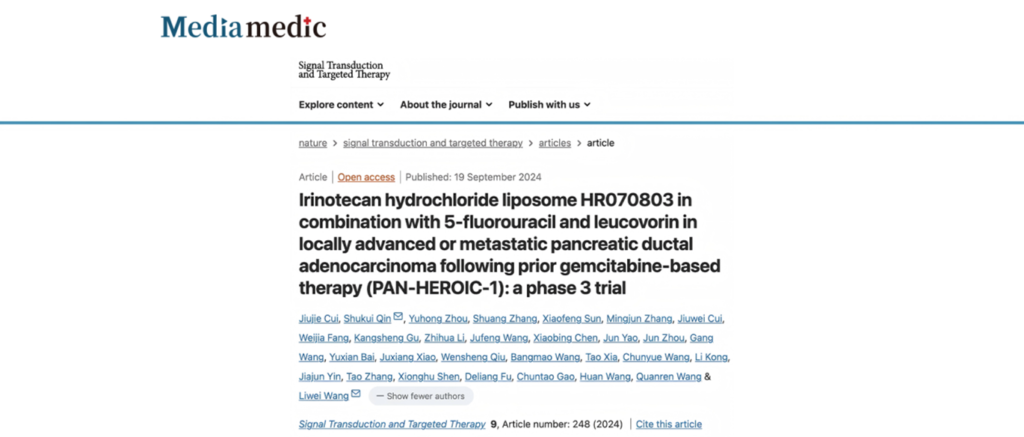
On September 19, 2024, a randomized, double-blind, parallel-controlled, multicenter phase III clinical study, co-led by Professor Shukui Qin from the Nanjing Tianyinshan Hospital Affiliated to China Pharmaceutical University and Professor Liwei Wang from the Renji Hospital, Shanghai Jiaotong University School of Medicine, was published in Signal Transduction and Targeted Therapy (IF = 40.8), a prestigious international medical journal under Nature. The study evaluated the efficacy of irinotecan liposome (II) combined with 5-FU/LV as second-line treatment for locally advanced or metastatic pancreatic cancer after failure of gemcitabine therapy. Our results showed that the irinotecan liposome (II) combination therapy reduced the risk of death by 37% compared to the control group. Based on this research, irinotecan liposome (II) combination therapy was included as a Grade I expert recommendation (IA evidence) in the 2024 edition of the Chinese Society of Clinical Oncology Pancreatic Cancer Diagnosis and Treatment Guidelines. This treatment regimen fills the gap in second-line therapy for locally advanced or metastatic pancreatic cancer patients in China.This study represents China’s first successful phase III registered clinical trial for second-line treatment of pancreatic cancer (PAN-HEROIC-1) and establishes a “Chinese solution” for advanced pancreatic cancer patients in the country.
Pancreatic cancer is a common malignant tumor in the digestive system, characterized by its insidious onset and high malignancy. Most patients are diagnosed at an advanced stage, with high recurrence, metastasis rates, and mortality. The 5-year survival rate is less than 8%, which is significantly lower than that of other malignant tumors. In 2020, there were 466,000 deaths globally from pancreatic cancer, ranking it 7th among all cancers. Currently, clinical treatment for locally advanced or metastatic pancreatic cancer mainly relies on chemotherapy. However, the limited drug options and suboptimal efficacy present significant challenges for patients, such as short overall survival and poor quality of life. Especially in second-line and subsequent treatments, patients often face the dilemma of “no available drugs,” which severely impacts survival, making clinical demand urgent.
Irinotecan, a topoisomerase I inhibitor, is a cornerstone of several classic chemotherapy regimens. Despite its widespread clinical use, conventional irinotecan formulations often suffer from reduced efficacy and increased risk of side effects due to its pharmacological properties, raising clinical management difficulties and reducing patient adherence. Therefore, protecting the drug’s active ingredient and improving its stability have become crucial in enhancing its efficacy and reducing toxicity.
In response to the unmet clinical needs for second-line treatment of pancreatic cancer in China, Professor Wang Liwei and I co-led a multicenter, randomized, double-blind, controlled phase III clinical study (PAN-HEROIC-1), aimed at evaluating the efficacy and safety of irinotecan liposome (II) + 5-FU/LV versus placebo + 5-FU/LV as second-line therapy for metastatic pancreatic cancer after failure of gemcitabine treatment. The primary endpoint was overall survival (OS), and secondary endpoints included progression-free survival (PFS), objective response rate (ORR), etc. (See Figure 1).
Between January 2018 and May 2021, we enrolled 298 patients from mainland China, who were randomly assigned in a 1:1 ratio to receive either irinotecan liposome (II) + 5-FU/LV or placebo + 5-FU/LV, until disease progression or intolerance. The OS data analysis was conducted as of November 18, 2021, with a median follow-up time of 12.81 months. In terms of primary endpoint, the median OS in the irinotecan liposome (II) group was significantly prolonged by 2.4 months compared to the placebo group (7.39 months vs. 4.99 months, HR = 0.63, P = 0.0019), representing a 37% reduction in the risk of death (Figure 2). Regarding secondary endpoints, the median PFS in the irinotecan liposome (II) group was extended by 2.73 months compared to the placebo group (4.21 months vs. 1.48 months), with a 64% reduction in the risk of disease progression or death. Safety was well-tolerated.
In clinical practice for locally advanced or metastatic pancreatic cancer in China, there has been no successful second-line treatment option. Currently recommended second-line regimens have not been based on confirmatory phase III trial results from mainland Chinese populations, and there is insufficient evidence from evidence-based medicine. The PAN-HEROIC-1 study, led by Chinese experts, involved 54 centers across the country and was designed based on China’s national conditions. The enrolled population consisted entirely of mainland Chinese patients, making it more closely aligned with China’s clinical treatment practices for pancreatic cancer. Our study demonstrated extended survival, better disease control, and favorable safety, thus filling the gap in second-line therapy for locally advanced or metastatic pancreatic cancer patients in China.
Reference
1.Cui J, Qin S, Zhou Y, et al. Irinotecan hydrochloride liposome HR070803 in combination with 5-fluorouracil and leucovorin in locally advanced or metastatic pancreatic ductal adenocarcinoma following prior gemcitabine-based therapy (PAN-HEROIC-1): a phase 3 trial[J]. Signal Transduct Target Ther, 2024, 9(1):248.


